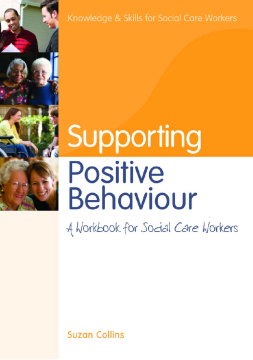
Additional Information
Book Details
Abstract
Communication problems, frustration and boredom can manifest themselves in physical outbursts, and working in a residential or domiciliary setting can involve responding to challenging behaviour towards staff and other residents.
Supporting Positive Behaviour examines the underlying reasons for the behaviour, ways to spot challenges before they occur and strategies to minimise or prevent incidents. This interactive workbook will help staff to understand appropriate interventions, how to monitor and record challenging behaviour, and implement strategies that will reduce the behaviours over time. The book is appropriate for all staff supporting people with mental health needs, people with a learning or physical disability, older people and people with dementia.
This workbook is a valuable source of guidance for any social care worker keen to improve their practice, and represents a cost-effective way for managers or trainers in residential and domiciliary settings to train staff.
The book will be a real help in staff development and training. There are excellent case studies, exercises and self-assessment "tools".
Caring Times
an excellent introduction and helpful tool to use "on the job" for person new into the soical care work force.
International Journal of Positive Behavioural Support
Suzan Collins is a trainer and consultant in management and social care, and was registered manager with the Commission for Social Care Inspection (CSCI), now called Care Quality Commission (CQC). She delivers training throughout the UK to service users, support staff, managers and HR staff in the NHS, statutory, private and voluntary sectors. She also assesses and internally verifies NVQs in Health and Social Care and Management and the Learning and Development awards, as well as being an active marker, verifier and consultant for the Learning Disability Induction Award programme. For more information go to www.suzancollins.com.
The opening paragraph of this interactive workbook reminds us that we must respect every person we work with, including those whose communication and behaviour we find "challenging". What a refreshing starting point. Other texts often offer a traditional medical model of challenging behaviour as purely symptomatic of the person's diagnosis, but here we begin with the "person first" and the book continues this emphasis throughout.
Journal of Dementia Care
